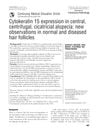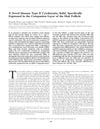TLDR Using special RNA to target a mutant gene fixed hair problems in mice.
The document from 2016 describes a study where allele-specific small interfering RNAs (siRNAs) were used to selectively suppress a mutant form of the Krt75 gene, which causes hair shaft defects in mice. The study showed that hair regenerated from mutant Krt75 mouse cells exhibited defects when grafted, but these defects were suppressed when the cells were treated with a lentiviral vector expressing mutant Krt75-specific short hairpin RNA (shRNA). This led to a significant reduction in mutant Krt75 mRNA and corrected the hair structural phenotype. The study suggests that RNA interference can be used to durably correct hair defects caused by mutant keratin genes and offers a potential therapeutic approach for disorders related to keratin mutations. Safety concerns regarding the use of lentiviral vectors were acknowledged, highlighting the need for safer therapeutic siRNA delivery methods.
69 citations
,
January 2015 in “Cell & tissue research/Cell and tissue research” Keratin mutations cause skin diseases and could lead to new treatments.
 17 citations
,
November 2012 in “Journal of Investigative Dermatology”
17 citations
,
November 2012 in “Journal of Investigative Dermatology” The document concludes that over 500 genes are linked to hair disorders and this knowledge is important for creating new treatments.
 99 citations
,
July 2012 in “PLoS Genetics”
99 citations
,
July 2012 in “PLoS Genetics” A mutation in the KRT75 gene causes frizzle feathers in chickens.
 109 citations
,
September 2011 in “Human molecular genetics online/Human molecular genetics”
109 citations
,
September 2011 in “Human molecular genetics online/Human molecular genetics” New treatments targeting specific genes show promise for treating keratin disorders.
 14 citations
,
January 2011 in “Journal of Cutaneous Pathology”
14 citations
,
January 2011 in “Journal of Cutaneous Pathology” CK15 is not a reliable marker for stem cells in damaged hair follicles from patients with CCCA.
427 citations
,
April 2008 in “Nature Protocols” 46 citations
,
September 2007 in “Journal of Investigative Dermatology” 138 citations
,
March 2007 in “Experimental cell research” Only a few hair-specific keratins are linked to inherited hair disorders.
88 citations
,
March 2004 in “Journal of Investigative Dermatology” 84 citations
,
April 2002 in “Archives of Dermatology” Loose anagen hair syndrome may be caused by keratin gene mutations.
101 citations
,
August 2001 in “The Journal of Cell Biology” A new keratin 6 type in mice explains why some mice without certain keratin genes still have normal hair and nails.
 139 citations
,
December 1998 in “The journal of investigative dermatology/Journal of investigative dermatology”
139 citations
,
December 1998 in “The journal of investigative dermatology/Journal of investigative dermatology” K6hf is a unique protein found only in a specific layer of hair follicles.
 6 citations
,
September 2015 in “Journal of Investigative Dermatology”
6 citations
,
September 2015 in “Journal of Investigative Dermatology” Using special RNA to target a mutant gene fixed hair problems in mice.
 28 citations
,
April 1996 in “Cell biology international”
28 citations
,
April 1996 in “Cell biology international” Changes in keratin affect skin health and can lead to skin disorders like blistering diseases and psoriasis.







